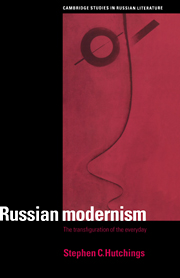Book contents
- Frontmatter
- Contents
- Acknowledgments
- Note on transliteration, citation and translation
- Introduction
- PART ONE
- PART TWO
- PART THREE
- 5 The struggle with byt in Belyi's Kotik Letaev and The Christened Chinaman
- 6 Breaking the circle of the self: Vasilii Rozanov's discourse of pure intimacy
- 7 At the “I” of the storm: the iconic self in Remizov's Whirlwind Russia
- Conclusion
- Notes
- Bibliography
- Index
- CAMBRIDGE STUDIES IN RUSSIAN LITERATURE
5 - The struggle with byt in Belyi's Kotik Letaev and The Christened Chinaman
Published online by Cambridge University Press: 28 October 2009
- Frontmatter
- Contents
- Acknowledgments
- Note on transliteration, citation and translation
- Introduction
- PART ONE
- PART TWO
- PART THREE
- 5 The struggle with byt in Belyi's Kotik Letaev and The Christened Chinaman
- 6 Breaking the circle of the self: Vasilii Rozanov's discourse of pure intimacy
- 7 At the “I” of the storm: the iconic self in Remizov's Whirlwind Russia
- Conclusion
- Notes
- Bibliography
- Index
- CAMBRIDGE STUDIES IN RUSSIAN LITERATURE
Summary
We must recreate everything and in order to do this we must create ourselves. And the only slope on which we may still clamber is ourselves. At the summit our “I” awaits us. Here is the answer for the artist if he wishes to remain an artist but not cease to be a man; he must become his own artistic form.
(Andrei Belyi)It is no coincidence that the texts in my final section all fall under the rubric of autobiography. The analysis in each chapter so far has culminated in considerations of the category of self. Chekhov and Sologub each understood that the transcendence of byt as the reifying effects of the anonymous other called for a shift from the territory on which that other is written – from literature (which, in its modern variant, remains in thrall to an anonymous, alienated readership), and from fiction (which deals in the abstractions of plotted roles). By its nature, autobiography highlights the private things of life, that myriad of everyday occurrences which come incrementally to determine the subject's intimate sense of self. The very point of such writing is to reveal to an unknowing public the secret dramas (beneath an ocean of mundaneness) to which only the self has access. Thus, autobiography represents the quintessence of the project which has daily life as its internal model: that of bridging the rift disjoining particular (private) from universal (public). By the same token, it becomes the faultline along which that project splinters apart as artists begin to doubt its validity.
- Type
- Chapter
- Information
- Russian ModernismThe Transfiguration of the Everyday, pp. 141 - 167Publisher: Cambridge University PressPrint publication year: 1997



